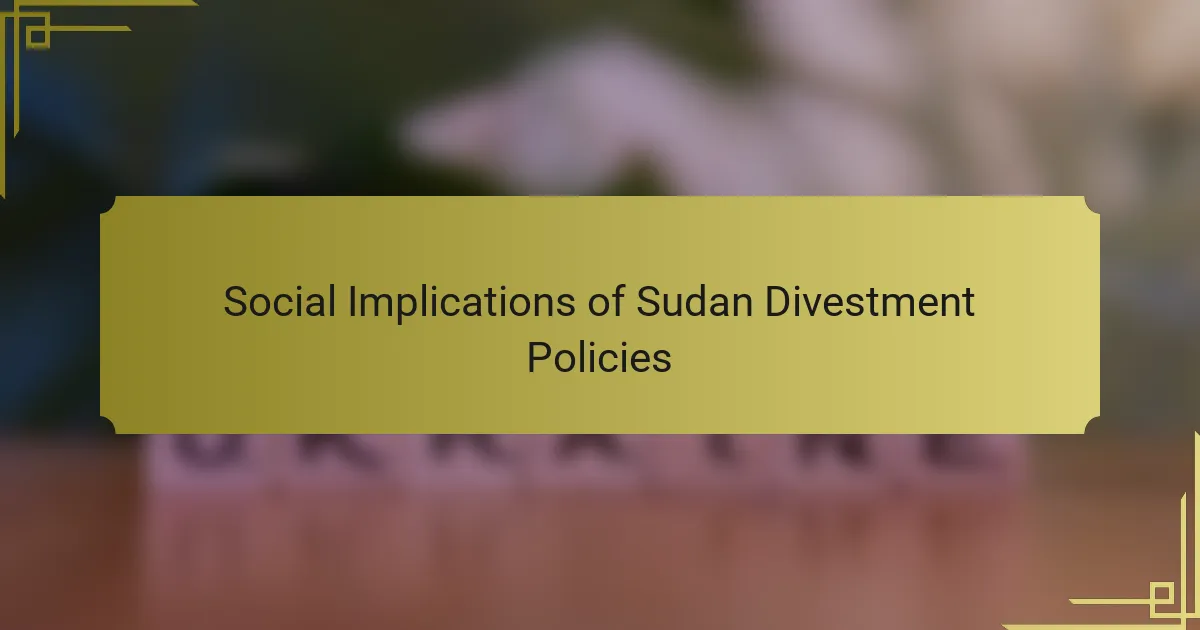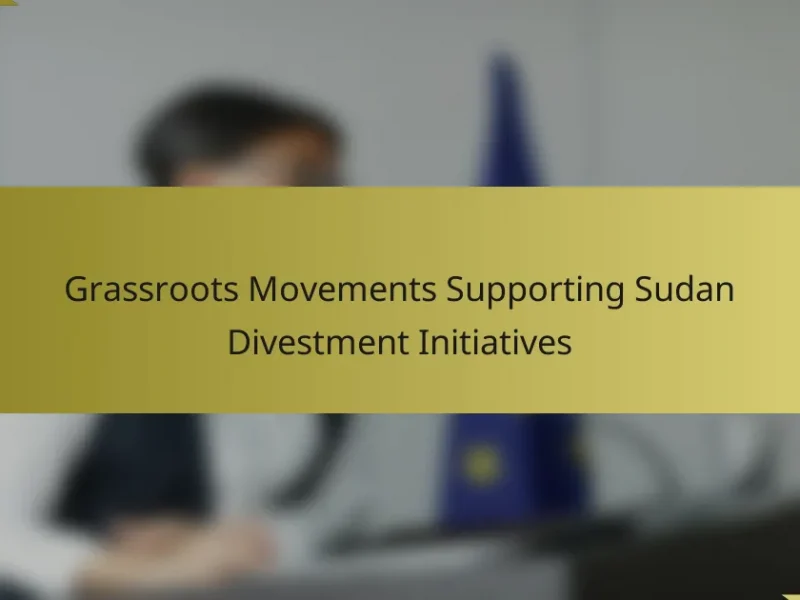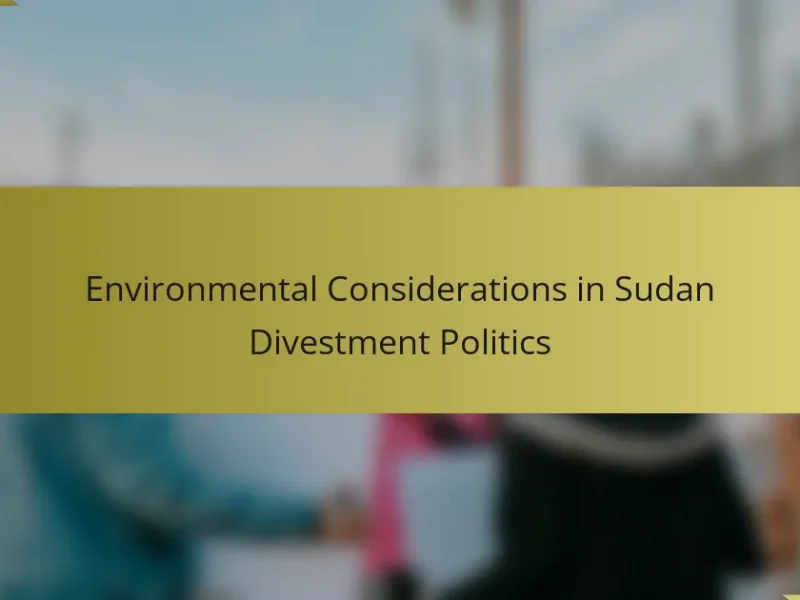Sudan divestment policies focus on withdrawing investments from entities that support the Sudanese government, aiming to raise awareness of human rights violations and empower local communities by redirecting funds to ethical businesses. These policies can lead to significant economic consequences, including reduced foreign investment and job losses, which may hinder Sudan’s economic growth. Stakeholders are encouraged to engage with local communities, collaborate with humanitarian organizations, and invest in alternative economic opportunities to mitigate negative social impacts. Monitoring the social effects of divestment and advocating for responsible investment practices are essential for fostering positive change in Sudan.
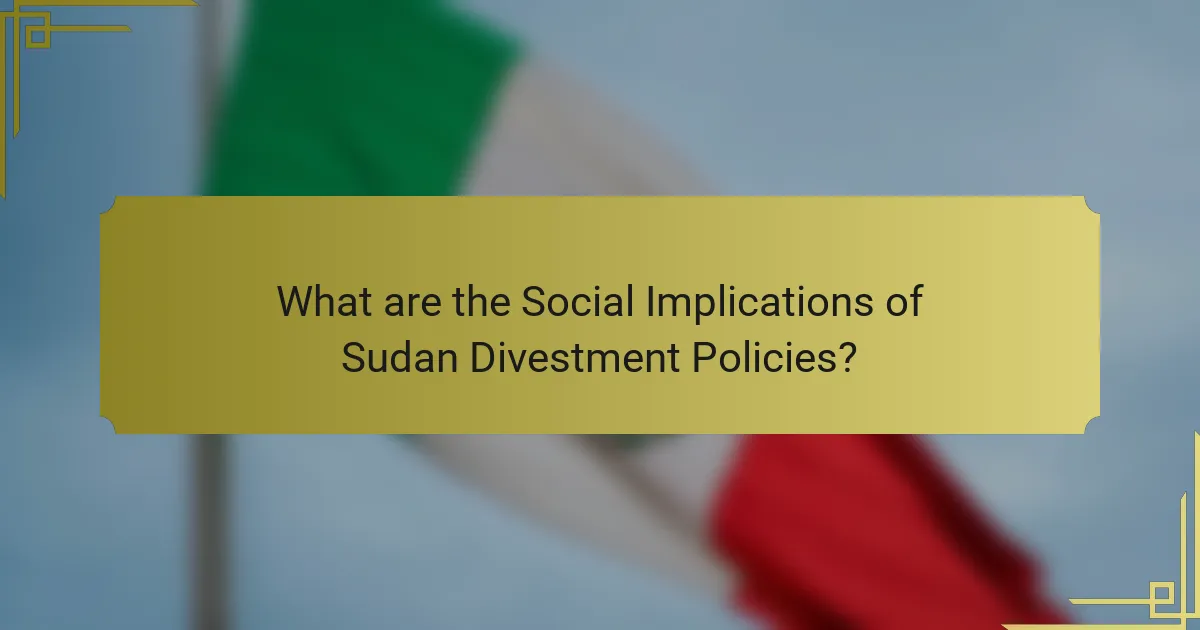
What are the Social Implications of Sudan Divestment Policies?
Sudan divestment policies aim to withdraw investments from entities supporting the Sudanese government. These policies can lead to social implications such as increased awareness of human rights violations. They may also empower local communities by redirecting funds to ethical businesses. Furthermore, divestment can pressure the Sudanese government to change harmful practices. Studies indicate that divestment can influence international relations and enhance global advocacy for change. For example, the Sudan Divestment Task Force reported that divestment efforts raised awareness and mobilized activism. Overall, these policies can foster social change and improve conditions in Sudan.
How do Sudan divestment policies impact local communities?
Sudan divestment policies significantly impact local communities by reducing funding for essential services. These policies often lead to economic instability. Local businesses may suffer due to decreased investment. Unemployment rates can rise as companies withdraw. Access to healthcare and education may decline without adequate funding. Social unrest can increase as communities face economic challenges. Historical examples show that divestment can exacerbate poverty in affected areas. Overall, the consequences of divestment policies are detrimental to local community well-being.
What specific social changes have occurred due to divestment?
Divestment has led to increased awareness of social issues in Sudan. Activism around divestment has mobilized communities globally. This activism has fostered a stronger sense of solidarity among affected populations. Additionally, divestment has pressured companies to reconsider their ethical practices. Some corporations have adopted more socially responsible policies as a result. This shift has influenced public opinion on corporate responsibility. Furthermore, divestment campaigns have highlighted the importance of ethical investment. Overall, these changes reflect a growing commitment to social justice in investment decisions.
How do these policies affect community health and well-being?
These policies significantly impact community health and well-being by reallocating resources and altering economic conditions. The divestment from Sudan is intended to pressure the government to change harmful practices. This can lead to improved health outcomes by fostering better governance and resource allocation. For instance, reduced funding for oppressive regimes can redirect funds to health services. Improved access to healthcare services can enhance overall community well-being. Studies show that economic stability correlates with better health metrics. Consequently, these policies can create a healthier environment for affected communities.
What role do international perceptions play in Sudan divestment?
International perceptions significantly influence Sudan divestment. Investors often react to global views on Sudan’s political and human rights situation. Negative perceptions can lead to reduced foreign investments and divestment from companies operating in Sudan. Reports from organizations like Human Rights Watch highlight human rights abuses in Sudan. These reports shape the international community’s stance. Consequently, companies may choose to divest to align with ethical standards. This divestment can further impact Sudan’s economy, leading to financial instability. Overall, international perceptions act as a catalyst for divestment actions in Sudan.
How do global opinions influence local social dynamics?
Global opinions shape local social dynamics by altering perceptions, behaviors, and policies within communities. When international sentiments shift, they can lead to changes in local attitudes towards issues like human rights and governance. For example, widespread condemnation of practices in Sudan influenced local activism and policy reforms. Research indicates that global awareness campaigns can mobilize local populations to demand accountability. This interaction often results in heightened political engagement and social movements. The influence of global media also amplifies local voices, creating a feedback loop that reinforces the local response to global issues.
What are the implications for Sudan’s international relationships?
Sudan’s international relationships are significantly impacted by its divestment policies. These policies often lead to sanctions from Western nations. Sanctions can restrict trade and financial support. Consequently, Sudan may seek alliances with non-Western countries. This shift can alter regional dynamics and partnerships. For instance, Sudan has engaged more with China and Russia. Such relationships may provide alternative investment opportunities. However, they may not offer the same economic benefits as Western partnerships. Overall, Sudan’s divestment policies create a complex web of international relations that can hinder economic growth.
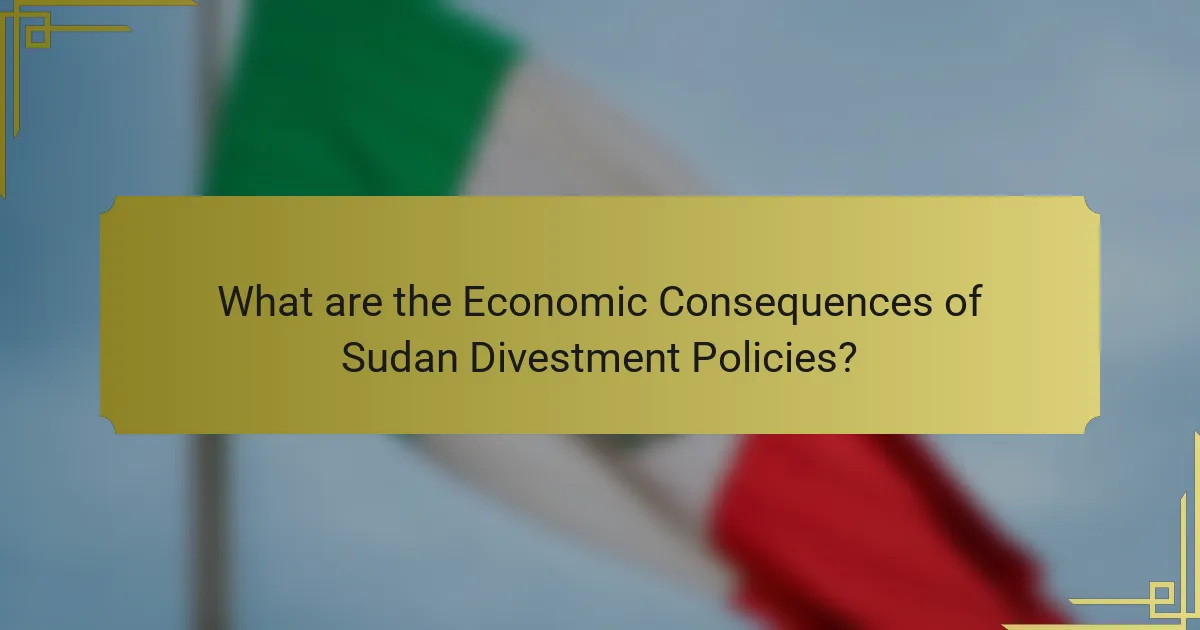
What are the Economic Consequences of Sudan Divestment Policies?
Sudan divestment policies lead to significant economic consequences. These policies often result in reduced foreign investment in Sudan. Investors may withdraw due to concerns over human rights violations and instability. Consequently, Sudan’s economy faces decreased access to capital. This reduction can hinder economic growth and development. Additionally, divestment can lead to job losses in various sectors. Industries reliant on foreign partnerships may struggle to sustain operations. Thus, the overall economic landscape of Sudan can deteriorate under prolonged divestment.
How do divestment policies affect employment in Sudan?
Divestment policies negatively impact employment in Sudan. These policies often lead to reduced foreign investment. When companies withdraw, local businesses suffer from decreased demand. Job losses occur as firms downsize or shut down operations. The agricultural and oil sectors face significant job cuts due to divestment. According to a 2018 report by the International Crisis Group, unemployment rates increased as a direct result of such policies. Additionally, the withdrawal of international firms limits skill development opportunities for the local workforce. Overall, divestment policies create a challenging economic environment that hinders job creation in Sudan.
What sectors are most impacted by these policies?
The sectors most impacted by Sudan divestment policies include oil, agriculture, and telecommunications. The oil sector faces significant disruptions due to reduced foreign investment. Agriculture experiences challenges as divestment affects supply chains and access to markets. Telecommunications suffers from decreased infrastructure development and investment, leading to service limitations. These impacts are evident as companies withdraw their operations, resulting in economic instability.
How does unemployment affect social stability in Sudan?
Unemployment significantly undermines social stability in Sudan. High unemployment rates lead to increased poverty and desperation among the population. This economic strain often results in social unrest and protests. For instance, in 2019, widespread unemployment contributed to protests against the government. Unemployment creates a sense of hopelessness, particularly among youth. This demographic is more likely to engage in civil disobedience when job opportunities are scarce. Additionally, unemployment can exacerbate ethnic and regional tensions, as marginalized groups feel excluded from economic participation. Overall, the correlation between unemployment and social instability in Sudan is evident through ongoing socioeconomic challenges and civil unrest.
What are the long-term economic forecasts for Sudan post-divestment?
Long-term economic forecasts for Sudan post-divestment indicate potential challenges and opportunities. Economic growth may decline initially due to reduced foreign investment. The divestment could lead to increased inflation and currency depreciation. However, there is potential for economic diversification. The agricultural sector might expand as local production increases. Additionally, the government may seek new trade partnerships. Historical context shows that similar divestment scenarios have led to economic restructuring. For instance, countries like South Sudan faced similar challenges but eventually adapted. Overall, the long-term outlook remains uncertain but suggests a need for strategic reforms.
How might divestment policies shape future investment opportunities?
Divestment policies can significantly influence future investment opportunities by redirecting capital flows. These policies often lead to the withdrawal of investments from specific sectors or companies deemed unethical or unsustainable. As a result, companies that align with ethical standards may gain increased investment interest.
For example, divestment from fossil fuels has spurred growth in renewable energy sectors. According to a report by the Global Sustainable Investment Alliance, sustainable investment reached $30.7 trillion in 2018, reflecting a growing trend. Additionally, divestment can create market gaps, allowing innovative companies to fill those spaces and attract new investors.
Furthermore, companies that are proactive about social responsibility may experience enhanced reputations, leading to increased consumer loyalty and long-term profitability. This shift in focus can reshape the investment landscape, encouraging more capital to flow toward socially responsible ventures.
What strategies can be adopted to mitigate negative economic effects?
Diversifying the economy is a key strategy to mitigate negative economic effects. This involves promoting various sectors such as agriculture, manufacturing, and services. By reducing reliance on a single sector, economies can better withstand shocks. Implementing social safety nets can also help protect vulnerable populations. Programs like unemployment benefits and food assistance provide immediate relief during economic downturns. Investing in education and skill development prepares the workforce for changing job markets. This fosters resilience and adaptability among workers. Encouraging foreign investment can stimulate economic growth and create jobs. Countries that attract diverse investments often see improved economic stability. Strengthening local businesses through grants and support can enhance community resilience. These strategies collectively contribute to a more robust economic environment.
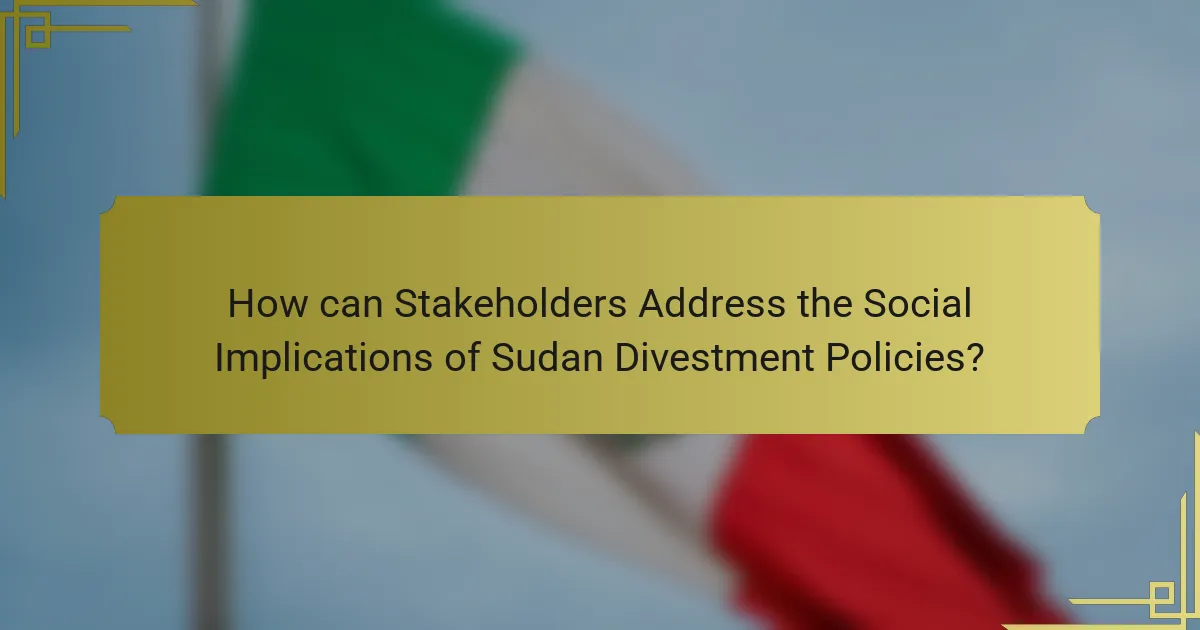
How can Stakeholders Address the Social Implications of Sudan Divestment Policies?
Stakeholders can address the social implications of Sudan divestment policies by engaging in dialogue with local communities. This engagement helps to understand the needs and concerns of those affected by divestment. Stakeholders should also collaborate with humanitarian organizations to ensure that basic services are maintained. Monitoring the social impact of divestment through research can provide valuable insights. Transparency in decision-making processes is essential to build trust with stakeholders. Additionally, stakeholders can invest in alternative economic opportunities for affected communities. Providing support for local governance can help mitigate negative social effects. Lastly, stakeholders should advocate for responsible investment practices that consider social outcomes.
What actions can local governments take to support affected communities?
Local governments can implement various actions to support affected communities. They can provide financial assistance for recovery efforts. This includes grants and low-interest loans to rebuild infrastructure. Local governments can also facilitate access to essential services like healthcare and education. They can organize community meetings to gather feedback and understand specific needs. Additionally, local governments can collaborate with non-profit organizations for resource distribution. They may also enact policies that promote job creation in affected areas. Furthermore, local governments can ensure the protection of vulnerable populations through targeted programs. These actions can significantly enhance community resilience and recovery.
How can NGOs contribute to social recovery in Sudan?
NGOs can significantly contribute to social recovery in Sudan by providing essential services and support. They can offer humanitarian aid, including food, healthcare, and education. NGOs often facilitate dialogue and peacebuilding initiatives among communities. They can also support local governance and empower marginalized groups. By addressing trauma and mental health, NGOs help individuals and communities heal. Furthermore, they can advocate for policy changes that promote social justice and equality. Their presence can foster resilience and rebuild trust within communities. Evidence shows that NGO involvement in post-conflict settings leads to improved social cohesion and recovery outcomes.
What role do international organizations play in this context?
International organizations play a crucial role in shaping divestment policies related to Sudan. They provide frameworks and guidelines that influence national and corporate decisions. Organizations like the United Nations and the African Union advocate for human rights and sustainable development in Sudan. Their reports and resolutions highlight the social implications of divestment, urging stakeholders to consider ethical factors. For example, the UN’s involvement has led to increased awareness of the humanitarian crisis in Sudan. This pressure often results in stronger divestment actions from countries and companies. Furthermore, international organizations facilitate dialogue among various entities to promote peace and stability. Their efforts aim to align economic actions with social justice and humanitarian needs in the region.
What best practices can be implemented to enhance social resilience?
Enhancing social resilience can be achieved through community engagement, collaboration, and education. Active participation in community decision-making fosters a sense of belonging. Building strong networks among community members enhances support systems. Programs that promote mental health awareness can reduce vulnerability to stressors. Education initiatives that focus on skills development prepare individuals for economic challenges. Investment in local resources strengthens community infrastructure. Research shows that communities with strong social ties recover faster from crises. For example, a study by the American Psychological Association highlights the correlation between social support and resilience during disasters.
How can community engagement be fostered in policymaking?
Community engagement in policymaking can be fostered through inclusive practices and transparent communication. Policymakers should actively involve community members in the decision-making process. This can be achieved by organizing public forums and workshops to gather input. Providing accessible information about policies allows citizens to understand their implications. Utilizing digital platforms for feedback can enhance participation, especially among younger demographics. Collaborating with local organizations can help reach diverse community groups. Research indicates that communities involved in policymaking tend to have better outcomes (Source: “The Role of Community Engagement in Policy Development,” by Smith et al., 2020). Engaging citizens leads to policies that reflect their needs and priorities.
What initiatives have proven effective in similar contexts?
Economic sanctions and divestment strategies have proven effective in similar contexts. For instance, divestment from South Africa during apartheid significantly pressured the government. This led to increased international isolation and eventual policy changes. Similarly, targeted sanctions against Sudan in the early 2000s aimed to address human rights violations. Reports indicate that these measures contributed to raising awareness and altering behaviors of key stakeholders. The effectiveness of these initiatives is supported by case studies demonstrating their impact on governance and social conditions.
The main entity of the article is Sudan divestment policies, which aim to withdraw investments from entities supporting the Sudanese government. The article examines the social implications of these policies, highlighting their effects on local communities, employment, and community health. It discusses how divestment can raise awareness of human rights violations, influence international relations, and lead to economic instability. Additionally, the article explores the roles of stakeholders, local governments, NGOs, and international organizations in addressing the social consequences of divestment and promoting resilience within affected communities.
